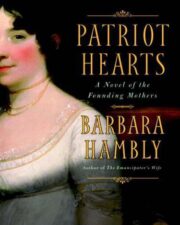With the closing of the port of Boston after Cousin Sam’s so-called Tea Party, John and Abigail had moved back to Braintree, to the house on the Plymouth road. Abigail was infinitely thankful for the move in April, when the Minutemen drove the British back into Boston and barricaded them there by encampments on the Boston Neck. Only weeks after that, while John was away at the Continental Congress in Philadelphia, four British warships dropped anchor not four miles from the house. Their goal was to seize hay stored on the nearby Grape Island as fodder for their horses in the town, but they could just as easily have come ashore in force and burned the farms.
All that summer, the countryside seethed. Refugees fled Boston and militiamen marched toward it, and all of them had to be provided with food, drink, and in many cases lodging for a night or a week. With her farm help disappearing into the Army and the tenant in the farm-cottage refusing to either pay rent or vacate, Abigail had been worked to a shadow milking, weeding, mending, cleaning. In June the British had tried to break the seige, and from the top of Penn’s Hill, Abigail and eight-year-old Johnny had watched through her spyglass as crimson-coated British regulars had twice charged the patriot defense works on Breed’s Hill, before the ragged militiamen had finally been driven away. Too mauled to follow up their victory, the British had returned to Boston. The settlement of Charles Town, beneath Breed’s Hill, lay in ashes.
Keep your spirits composed and calm, John wrote her that summer, and don’t suffer yourself to be disturbed by idle reports and frivolous alarms. Every refugee and soldier carried rumors. They spread them like an infestation of lice: of British attack, of smallpox in Boston, of Indians in British pay poised to murder. Moreover, every village and farmstead bubbled sullenly with suspicion, as patriots burned the barns and mutilated the stock of those who remained loyal to the Crown, and Loyalists fled to Boston carrying with them intelligence about the countryside and the disposal of patriot troops.
In case of real danger, John wrote, fly to the woods with our children. Abigail was aware that John’s place was unquestionably with the Congress, fighting to unite the disparate colonies into an entity capable of fielding an army—
But if he’d been in the same room with her then, she’d have brained him with a stick of firewood.
Through all that, Nabby was at her side. Washing clothes and making soap, churning butter and dragging ashes to the ash-heap, trying to save pins and medicine, salt and tinware, coffee and fabric and all the other things that British trade had provided and British laws had forbidden the colonies to manufacture. Trying to make the tiny cache of “hard” currency hidden in the attic floor-boards last as long as it could.
Six-year-old Charley thought that another raid by the British would be a tremendous lark (“I’ll kill ’em, Ma, you’ll see!”) and Johnny drew up intricate contingency plans on the sanded kitchen floor. But what Nabby thought of any of it, Abigail never knew.
At night she told them stories from Virgil and Horace and Livy, of Roman strength and Trojan determination: Horatio guarding the bridge, and Appius who stabbed his own daughter to death rather than have her live a slave. Or tales from the Bible: David and Gideon and Deborah, who led God’s chosen people to victory.
My heart is toward the governors of Israel, that offered themselves willingly, the ancient prophetess had sung. They fought from heaven; the stars in their courses fought against Sisera—the river Kishon swept them away.
“We must be strong,” she told her children, “and keep ourselves fit to be of use to our country.” Johnny’s eyes brooded in the firelight and Charley’s shone, and even Tommy forgot his ever-present fear. Nabby quietly stitched at their shirts, or braided candlewicking, and said nothing. Abigail tried not to think of what would become of them during a British raid, or if she were killed.
Winter came. In its shadow, the pale horseman of sickness rode over the barren fields. John’s brother Elihu died in the camp at Cambridge. Abigail’s sharp-tongued sister Mary fell ill in Salem, and at the Weymouth parsonage, so did her younger sister Betsey, twenty-six that winter and still unwed. When John’s mother fell ill, and Abigail’s servant-girl Pattie and little Tommy, Abigail sent the older boys away to her sister in Salem. Eventually eight of their neighbors died. Some nights Abigail was so exhausted she could only cling to her daughter’s shoulders and weep with weariness, feeling the girl’s thin body stiff as a doll with fear. The day Pattie died, it was Nabby who brought Abigail word that Abigail’s mother was sick as well.
John’s mother recovered, tough as a little walnut.
Abigail’s mother died.
“I’m sorry about the cook.” Nabby winced, groped for her mother’s hand. In her voice Abigail could hear the tremor of pain and fright. “Dinner on Sunday was absolutely frightful, and William went down to the kitchen and found her by the hearth, drunk—and on his brandy, too! It was the third time since Christmas—”


"Patriot Hearts: A Novel of the Founding Mothers" отзывы
Отзывы читателей о книге "Patriot Hearts: A Novel of the Founding Mothers". Читайте комментарии и мнения людей о произведении.
Понравилась книга? Поделитесь впечатлениями - оставьте Ваш отзыв и расскажите о книге "Patriot Hearts: A Novel of the Founding Mothers" друзьям в соцсетях.